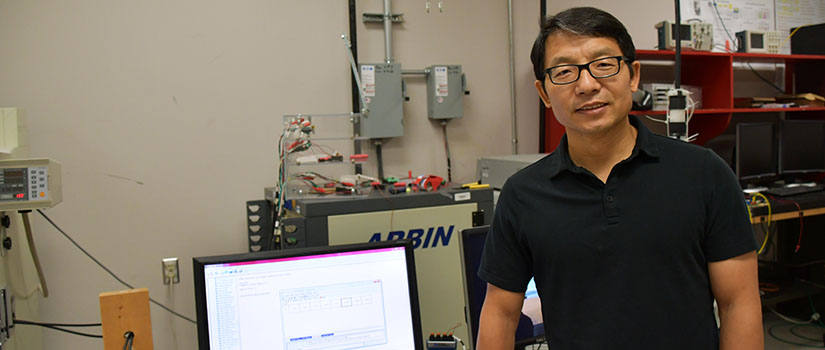Associate Professor Bin Zhang stands in front of a battery testing system that can conduct data acquisition for research on lithium-ion battery state estimation and life prediction.
A leader in energy research, the University of South Carolina is part of the SC Nexus consortium, a regional technology and innovation hub for advanced energy research.
Research and development are essential for industry. While new products are created, old processes are updated through technological innovation. But there can be limitations to R&D in industry, including costs, time and termination due to new competitors in the market.
Electrical Engineering Associate Professor Bin Zhang has research experience in industry but prefers the flexibility of research opportunities in academia.
Zhang has more than 20 years of experience in prognostics and health management of control systems, machine learning, artificial intelligence and robotics. His research, including the last 11 years at the College of Engineering and Computing (CEC), has led to the development of techniques for monitoring, control and intelligence to applications including power grids, lithium-ion batters, and manned and unmanned vehicles.
Zhang says that the major difference between research at industry and the CEC is that industrial research must follow the company’s strategy. But in academia, any research with potential and appropriate sources can be investigated.
“I like being able to change the focus of my research if necessary. For example, if my research initially focuses on a mechanical system gearbox, I can switch to a battery because it’s more commonly used and has more potential,” Zhang says.
Zhang attended Nanjing University of Science and Technology in China, where he earned his bachelor’s and master’s degree. While his undergraduate studies focused on control systems, which direct the behavior of other devices, manufacturing was the emphasis of his graduate program. After working in industry for a few years, his desire for more knowledge led him to pursue his Ph.D. in electrical engineering with a focus in robotics from Nanyang Technological University in Singapore.
“Electrical is still in the broad area of mechanical engineering, especially when I moved toward robotics. Having a background in both mechanical and electrical has been helpful in my current research in prognosis and health management to detect faults in a control system,” Zhang says. “You can’t just use data; you need to have knowledge of the system.”
Zhang moved to the U.S. after earning his Ph.D. and began a postdoctoral position at Georgia Tech for three years before returning to industry. He worked as a senior project engineer and lead engineer at Impact Technologies in Rochester, New York, and was a senior research engineer for General Motors research and development. According to Zhang, his time at Impact Technologies particularly helped prepare him for a career in academia.
“Just like faculty, I wrote proposals and had to deliver results to customers like NASA, the U.S Army and Department of Defense. I liked doing this, so I thought about moving to a university. The good thing for me was that I didn’t stop doing research even though I was in industry, and that allowed me to become a professor,” Zhang says.
Zhang believes that his industry experiences have helped him connect his teaching and research to control systems and other products in real world settings.
“I know how systems run and the students like that because many of them have only been in school and not had a chance to go into industry. Connecting my experiences with something I delivered to a real system is good for the students and me,” Zhang says.
While Zhang’s primary research interests are prognostics and health management, the applications of his work are broad. This includes a previous project with NASA at the system level on a water processing function for an outer space propulsion system. Zhang is currently working with Department of Electrical Engineering Chair Mohammod Ali on his project by using different methods to monitor cable installation degradation.
“Bin’s work on prognostics and diagnostics is grounded in deep technical knowledge on the mathematics of rapidly changing dynamic systems like the power grid and batteries,” Ali says. “He brings valuable knowledge through his previous industry experience that keeps his research relevant to many industrial needs.”
Zhang believes all his research is interconnected. He continues to work with prognostics and health management, which is now connected to artificial intelligence, machine learning and robotics. For example, if his research involved a lithium-ion battery, he would utilize model-based methods to develop different algorithms and for monitoring the current state of the battery. But he would also include a data-driven machine learning method to predict situations and outcomes and if it can accomplish research goals.
“When designing a system, you need to include some controllers to improve its performance. And once the system is operating, you can add some intelligence, such as having robots talking to one another,” Zhang says. “But no matter how well it’s been designed, fault and degradation may happen. All of this helps diagnosis the problem and what is needed to fix the issue.”
While Zhang is grateful for his research experience in industry, his work in academia at the CEC and Georgia Tech has allowed his finding to be presented for a more widespread audience. This includes his more than 200 journal publications and conference presentations.
“If specific research is not part of a company’s strategy in industry, it's almost impossible to change directions,” Zhang says. “But here, I can extend my research and make it broader to meet the needs of colleagues, the university and society.”
